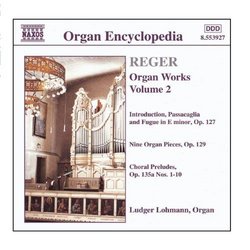Magnificent Sound
Avid Reader | Franklin, Tn | 10/28/2003
(5 out of 5 stars)
"Naxos has done it again! This CD is a superb representation of the Reger canon. Although there have been attempts to play Reger a la French, he was at heart a German Romantic and as such, his music sounds more authentic on the non-singing organs associated with the Germanic areas of Europe. The soloists seem to recognize this and keep things at a steady but not pedantic pace.In this case the listener is blasted with pure sound from the Passacaglia and the fiendish fugue is a masterpiece of composition and interpretation - simultaneously Romantic and modern. Also great rendering of the Toccata & Fugue, the beautiful canon and the Cappricio which is anything but light. The organ pieces here demonstrate that they can indeed be played - much as the newest Godowsky CD proves that his works are also playable."
Reger's Op. 127: a rare recording for a masterpiece
Avid Reader | 08/29/1999
(4 out of 5 stars)
"Reger's op. 127 is a monumental interior fresco; often accused of excessive lenght and prolixity, in reality his structure is unusually clear; the double fugue is one of Reger's most expressive and romantic large-scale contrapuntal works. It's also included, with op. 57 and 73, in his "unplayable" works. In a digital recording's survey, a part from G. Barber's rather colourless performance (Priory) and R. Haas's incomprehensible and unnatural speed (MDG: it seems more a midi file than human hands and feet...), in my opinion Daniel Matrone (REM, 1988) remains the absolute reference: with his particular, "French" eccentricity, fashinating but not too sensitive to philological approaches; and an instrument's sound so various, coloured and absolutely clear. We were waiting Lohmann's performance (after his excellent Rink's CD, Naxos too, and the confirmation we had from his great live performance in Padova) to discover pheraps another revealing side, more strict and rigorous, of this masterpiece... We find a controlled reading, but rather dark, finally without any real new addition of expressive functionality. The sound is rather close too... Anyway, in my opinion it's good if you like to discover this rare masterpiece, even if (is it unavailable?) Matrone keeps up... the throne.Roberto Ranieri"


 Track Listings (18) - Disc #1
Track Listings (18) - Disc #1